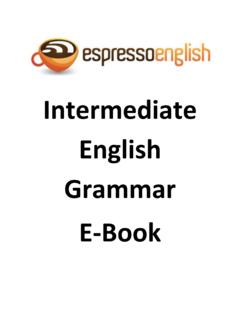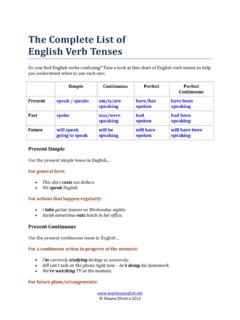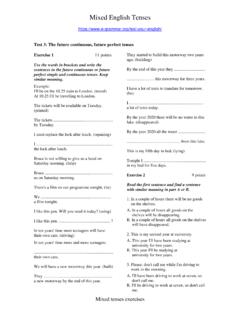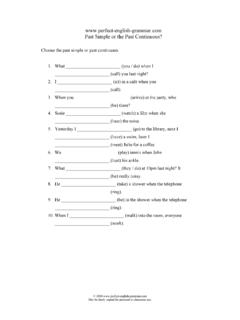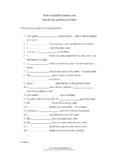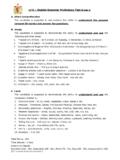Transcription of Free English Grammar E-Book
1 free English Grammar E-Book Level 2. ~2~. Table of Contents Present Continuous For Future Use 5. Will or Going To? . 6. Linking Words: Reasons and Results 7. Linking Words: Adding, Organizing, Summarizing 10. Linking Words: Contrasting Ideas 13. Tips for Learning Irregular Verbs 14. Simple Past and Past Continuous 20. Present Perfect + Ever / Never 23. Present Perfect + Yet / Already / Just 25. Present Perfect + For / Since 27. Present Perfect Simple / Continuous 28. Comparative Adjectives: Not as _____ as 30. Comparative Adjectives: Quantifiers 31. Comparative or Superlative? 33. So / Neither / Too 34. Verbs + Infinitive or ING 38. Permission, Obligation, Prohibition 42. Prepositions of Time 46. Prepositions of Place 51. Prepositions of Movement 56. Relative Clauses 61. Word Order: Asking Questions 65. ~3~. Direct and Indirect Questions 70. Two Forms of Used to 73. Too and Enough 74. Some / Any / No 75. Subject-Verb Agreement 78. First Conditional 81. Second Conditional 83. Should / Could / Would 85.
2 Past Perfect 88. Present Perfect or Past Perfect? 91. Passive Voice: Present / Past 94. Reported Speech: Statements 95. Reported Speech: Requests, Orders, Questions 97. ~4~. Welcome! Thanks for downloading the free English Grammar E-Book Level 2 I hope it helps you with your English studies! If you have any questions about the lessons, please e-mail me at Espresso English has over 300 fun, fast online English lessons ( ). You can also sign up to get new English lessons every week by e-mail, as well as the free English Grammar E-Book Level 1. Please Share This Book This book is free , but can I ask you to help me with one thing? Please post a link to the book on Facebook and Twitter to share it with your friends and classmates. Thanks I really appreciate it! ~5~. Present Continuous For Future Use Talking about the future in English Many students use only will or going to in order to talk about the future. However, it's very common to use the present continuous to talk about the future, in the case of arrangements that are planned: + I'm having dinner with friends tonight.
3 + She's meeting David at the train station tomorrow. - He isn't coming to the party. - We aren't seeing our family this weekend. ? What are you doing on Saturday? ? Is Mary arriving at 7:00 or 8:00 tomorrow morning? You can use the present continuous for future plans with these words: tonight, tomorrow, this weekend next week/month/year this summer/fall/winter/spring on Monday/Tuesday/Wednesday/etc. next Monday/Tuesday/Wednesday/etc. ~6~. Will or Going To? There are two additional ways to talk about the future in English : will/won't and going to. Use going to for plans and arrangements: On my next vacation, I'm going to stay in a nice hotel in Paris. She's going to look for a new job after her current contract ends. David's going to meet me at the airport at 8:00. We're going to get married next July. They're going to visit Amy next week. They made plans to meet up on Monday. Peter and Paul are going to share an apartment when they move to New York. Note: You can also use the present continuous for the future in these cases.
4 On my next vacation, I'm staying at a nice hotel in Paris. David's meeting me at the airport at 8:00. We're getting married next July. Use will/won't for promises: I ll send you an e-mail. I won't tell anyone your secret. He ll pay you back tomorrow. We won't forget your birthday. Use will for offers: I ll buy you a drink. My secretary will help you with the paperwork. Use will for decisions made in that moment: Would you like potatoes or rice? . I ll have the rice.. Which shirt do you like? . Well, the red one is cheaper, but I prefer the color blue. I ll take the blue one.. ~7~. You can use either will/won't or going to for predictions or general statements about the future: My company s going to move its headquarters overseas next year. My company will move its headquarters overseas next year. Your wife will love those flowers they're beautiful! Your wife's going to love those flowers they're beautiful! The economy isn't going to improve much this year. The economy won't improve much this year.
5 He won't pass the test. He hasn't studied at all. He's not going to pass the test. He hasn't studied at all. Use I think will and I don't think will to express thoughts about the future. Don't use I think won't. (it doesn't sound natural). I think you won't like this movie. It's very violent. I don't think you'll like this movie. It's very violent. Will/Won't vs. Going to Quiz Click here to take the quiz! #quiz Linking Words: Reasons and Results Image source: Linking words help you connect the ideas in a sentence. In this lesson, you'll learn some common linking words to express reasons and results. Linking Words: Reasons ~8~. Because / Because of The difference between these two words is that because is followed by a subject + verb, and because of is followed by a noun: The game was canceled because of the rain. The game was canceled because it was raining. In spoken English , many people say 'cause as a short form of because.. Due to / Owing to Due to and owing to are also followed by a noun.
6 These words are a little more formal. There's a lot of traffic today due to the upcoming holiday. (holiday = noun). The after-school program was canceled owing to lack of interest from the students. (lack = noun). Due to the fact that / Owing to the fact that Use these phrases before a subject + verb. Again, these phrases are a little more formal. Many people are still unemployed due to the fact that the economic recovery has been slower than anticipated. The publisher rejected the author's latest work owing to the fact that the manuscript was full of errors. Since / As Since and as are more informal, and they are followed by a subject +. verb. I'm going to bed at 10 PM since I need to get up early tomorrow. I didn't go to the gym today, as I had a lot of homework to do. Linking Words: Results ~9~. Therefore / Consequently / As a result These words are more formal, and are more commonly used in written English . Our company's profits have increased 150% in the past year. Therefore, we're going to invest in new equipment and training programs.
7 The tennis player had knee surgery mid-October; consequently, she took the rest of the season off. There have been heavy rains throughout the interior of the state. As a result, several areas have experienced flooding. So So is more informal, and more commonly used in spoken English . We were hungry, so we stopped at a cafe for a snack. Linking Words Quiz: Reasons and Results Click here to take the quiz! results/#quiz ~ 10 ~. Linking Words: Adding, Organizing, Summarizing Adding Information and Examples for example / for instance Use these words to give one example of the idea you are talking about. Both of these expressions can go at the beginning or the end of a sentence. There are a number of problems in this school. For example, many of the classrooms don't have audiovisual equipment. She has a lot of good ideas for our business opening an online store, for instance. Written English : and In written English , we can use to give further explanation or clarification; it means that is or in other words.
8 Our last marketing campaign failed ( we spent $50,000. and didn't make many sales). We can use to give examples; it means for example . I enjoy radical sports ( rock climbing, hang gliding, and windsurfing). In formal writing, these expressions always appear inside parentheses. namely / such as There is a difference between namely and such as. Namely is followed by ALL of the examples you referred to, but such as gives only one or some of the examples, not all of them. ~ 11 ~. A few of the students namely Brian, Thomas, and Jack failed the course. A few of the students, such as Brian, failed the course. also / too Also can go in the middle of a sentence, whereas too is typically used at the end. We did a lot of sightseeing on our vacation. We also bought a number of souvenirs. We did a lot of sightseeing on our vacation. We bought a number of souvenirs, too. as well / as well as As well goes at the end of the sentence (similarly to too). As well as must be followed by another word. She's not only extremely successful, she's beautiful as well.
9 She's beautiful as well as being extremely successful. in addition / moreover / furthermore These linking words are usually used at the beginning of a sentence to add another idea or further develop the previous point. People who exercise regularly have more energy during the day and sleep better at night. In addition, they tend to live longer. Construction on the new subway has been delayed for months due to budget shortfalls. Moreover, the workers are threatening to go on strike. Our sales are expected to rise 30% in the next year. Furthermore, purchase of new equipment will help cut manufacturing costs and increase profits. ~ 12 ~. Note: In addition, moreover, and furthermore are more formal English . In informal spoken English , we usually use the expressions plus, what's more, and besides. Organizing and Ordering Information Firstly / Secondly When you are going to make a series of points, you can use firstly and secondly for the first and second points. After that, you can use The third point, The fourth point, etc.
10 Or in addition.. Lastly / Finally For your final point, you can begin the sentence with lastly or finally. These words show your audience that you are almost finished. the former / the latter You can use these words to refer back to two examples previously mentioned: Our company has two factories: one in Detroit and one in Atlanta. The former is operating at 95% capacity and the latter at 65%. In this case, the former = the factory in Detroit, and the latter = the factory in Atlanta. Summarizing Information Here are some English phrases you can use to give a summary of the information you have already said or written. In general, these phrases go at the beginning of the sentence and are followed by a comma. In short, In summary, To summarize, In conclusion, In a nutshell, (more informal). ~ 13 ~. Linking Words: Contrasting Ideas Image source: But / However But is more informal than however. You can use however at the beginning of a sentence, but you can't use but at the beginning of a sentence (in written English ).

